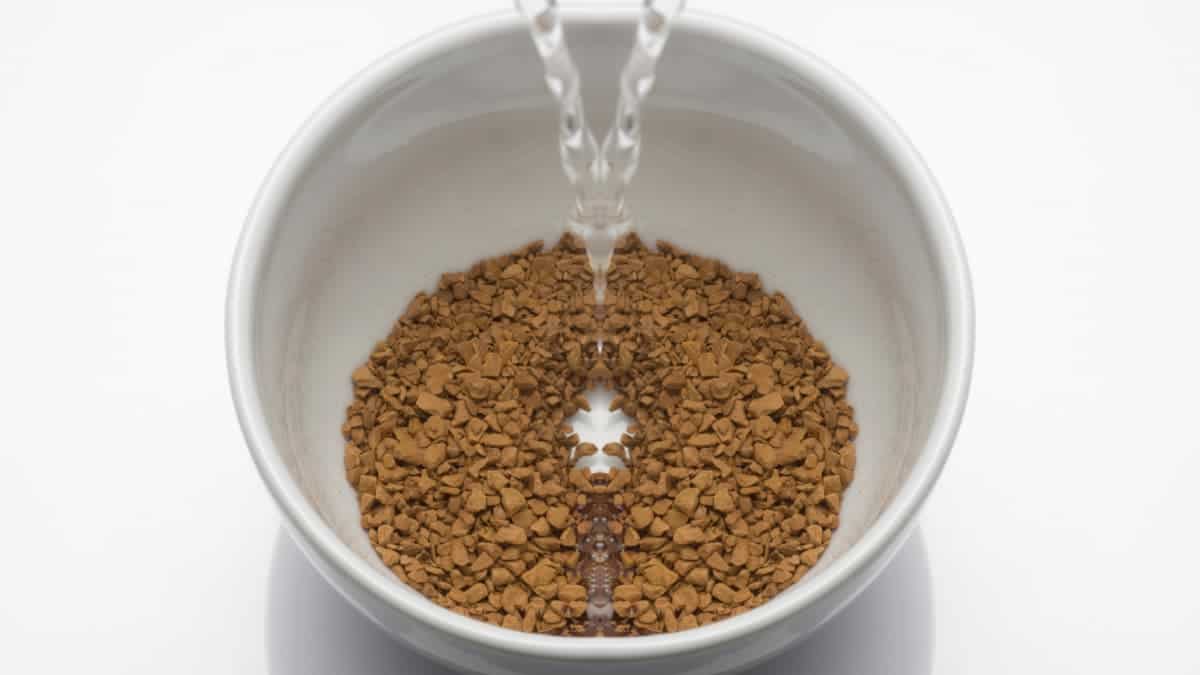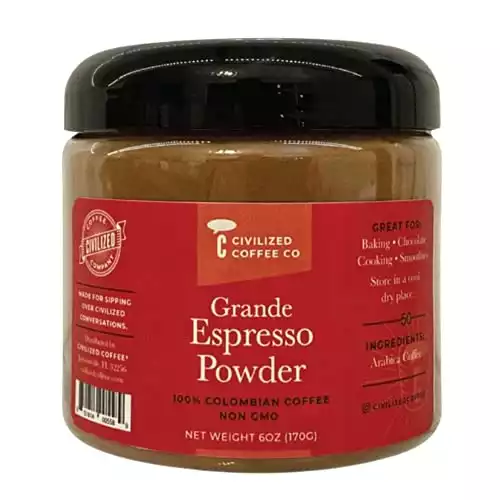Espresso Powder vs Instant Coffee
If you’re looking for a fast way to make coffee drinks, you’ve considered using instant coffee. Instant coffee is well-known for being a no-fuss way to make coffee. It’s convenient and you can find it almost anywhere.
Now you’ve discovered espresso powder and you wonder if this is a better way to make fast coffee. After all, espresso powder and instant coffee look similar. They even smell similar. Can you use them interchangeably?
In this article I’ll cover the differences between instant coffee and espresso powder, when you can use each one, and which is the best for your cup of coffee.

What Is Instant Coffee
Instant coffee is a concentrated form of coffee. Instant coffee is usually made from robusta coffee beans that have been roasted and ground. Those roasted beans are then brewed.
After the ground coffee beans are brewed, the brew is dehydrated, which creates coffee crystals. Those coffee crystals are then ground and packaged.
To make a cup of coffee, you only need to rehydrate those regular instant coffee granules (add water to them). No brewing required. Just put instant coffee in a cup, add hot water, and stir.
As you can see, instant coffee powder is more convenient and faster than regular brewed coffee. It’s also less expensive than buying regular coffee. And since instant coffee is completely dried, with no moisture left, it has a long shelf life.
It’s prized for its convenience. You can take those lightweight instant coffee granules anywhere, and to make coffee on the go you don’t need any equipment. You simply add a bit of powdered coffee to hot water, and you have your daily cup of goodness.
Instant coffee is generally made from low-quality coffee, the less-expensive Robusta beans. That’s one of the reasons why instant coffee is cheaper. It also explains why most instant coffee has a more bitter taste than regular coffee.
The caffeine content in instant coffee is lower than drip coffee. An 8-ounce cup of instant coffee gives you a caffeine level between 30-90 mg of caffeine, depending on how you prepare it. In a cup of regular coffee you’ll get more caffeine, from 70-140 mg of caffeine (depending on how it’s brewed).
To dehydrate coffee, the two most common methods are the freeze-drying process or spray-drying.
In spray drying, the brewed coffee is sprayed into hot air, which dehydrates the brew and creates a powder. Since this happens very fast, aroma and flavor are preserved.
When coffee is freeze-dried, it’s initially frozen at temperatures around -40 degrees Celsius. Then the coffee goes through a second drying process at less extreme temperatures.
Since the tastes and aromas suffer during the drying process, some companies add coffee aroma or coffee flavor to the ground coffee crystals.
What Is Espresso Powder vs Instant Espresso
In the same way, instant espresso powder is also a form of concentrated coffee. Powdered espresso is made from what is commonly called espresso beans, or arabica coffee beans that have been roasted dark.
Those dark roast coffee beans are ground and brewed. Then the brew is dehydrated and ground into a very fine powder. (This is starting to sound familiar, isn’t it?).
Espresso powder is then ready to use. As with instant coffee, you don’t have to have an espresso machine or even brew coffee to get a cup. Just add hot water to the instant espresso. And enjoy how those ground coffee crystals dissolve fast in water.
All in all, Instant espresso powder is a much more concentrated form of ready-to-use coffee than instant coffee. It’s not the same, though. They cannot be used interchangeably.
Espresso powder is made with Arabica beans. This gives it a smoother taste. These higher-quality Arabica beans, which are often from Latin America, are also given a different treatment. They are usually spray-dried, which retains a better flavor than freeze-dried.
Related reads: Espresso beans vs coffee beans, what is espresso?
If you were planning on using it for your morning cup of goodness, though, you might be a bit disappointed by how it tastes.
Espresso powder, occasionally called espresso crystals, has a stronger, darker flavor than instant coffee. That’s why you only need to use a small amount of powdered espresso.
But that same intensity makes it hard to get a drinkable cup from powdered coffee. Its intensity can be so overwhelming that it can be difficult to determine the correct amount for a cup of coffee.
If it’s not good for drinking, what is espresso powder good for? Generally, it’s used for baking. Espresso powder gives a boost to chocolate desserts.
The twist is that it doesn’t give your baked goods a coffee taste. But if it doesn’t taste like coffee, why is espresso powder used as a flavor enhancer for chocolate treats? Because espresso powder greatly enhances the complexity and depth of chocolate desserts, providing a more intense chocolate flavor.
If you are trying out a recipe that calls for espresso powder and you want to substitute instant coffee, remember that espresso powder is more concentrated than instant coffee.
You’ll need to adjust the recipe, and you can try using just one teaspoon as a good starting point.
As you would expect, the caffeine content in powdered espresso is higher per ounce than the caffeine in regular brewed coffee.
So you’ll get about twice as much caffeine per serving, about 63 mg of caffeine for an ounce or two. It also has more caffeine than instant coffee.
If you’re looking for espresso powder at your local supermarket and can’t find it, there’s a reason. It’s not popular because it’s not easy to use as a drink. But, if you really need it, don’t despair: you can buy it online.
Instant Coffee vs Espresso Powder: Which Is Better For Me?
Which should you use, instant coffee or espresso powder?
We want to be clear that espresso powder and instant coffee do not give you fantastic tastes in the cup. For the best-tasting coffee, brewing a fresh pot using ground coffee beans is always the best route.
But there are times when you can’t brew a pot of coffee. If you’re traveling or in another situation where brewing coffee is difficult, making instant coffee or espresso powder may be your best (or only) option.
If you need a powdered form of coffee, which should you use? Here are the pros and cons when comparing both instant coffee and espresso powder:
Instant coffee
PROS (+)
- Easy to find online & offline
- Easy to adjust amounts to make a cup of coffee
CONS (-)
- Harsh tastes
- Often made from Robusta beans
Espresso powder
PROS (+)
- Stronger concentration
- Smoother tastes
- Often made from Arabica beans
CONS (-)
- Harder to find
- May have to buy on the internet
- More expensive than instant coffee
If you’re looking for a quick caffeine fix, which gives you more of a boost, espresso powder vs instant coffee? Not surprisingly, the espresso powder does.
Wrapping Up
Both espresso powder and instant coffee give you the convenience of making a cup of coffee by just adding hot water.
Espresso powder is made with Arabica beans and gives you smoother tastes. But the highly concentrated ground coffee crystals make it hard to make a drinkable cup of coffee.
Instant coffee is made from mostly Robusta beans, which are harsher. But the less concentrated form is easier to adjust to make a coffee drink at home. That’s why most people use instant coffee for drinking and espresso powder for baking.
Feel free to experiment with espresso powder and instant coffee to see which gives you the best results.



